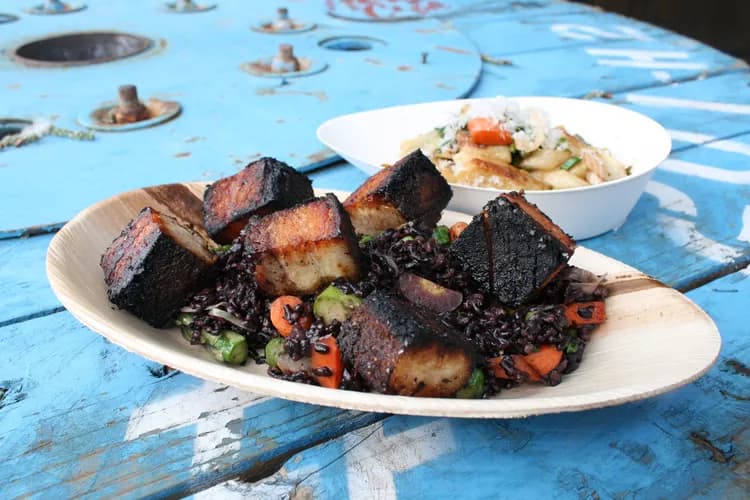Food becomes charred when it is cooked uncontrolled to high temperatures using excessive heat. Burnt or charred food has lost its nutritional value, its taste, and flavor. The char or ash from the organic matter (vegetables, fruits, or meat) is also completely devoid of any calories.
Studies have shown that smoking and charcoal grilling can also result in the formation of food carcinogens. Charring of proteins found in fish, meat, and chicken (due to high heat) may give rise to heterocyclic amines (HCAs) that have the potential to cause cancer in humans. Overburnt, overheated, or smoked foods may also give rise to a group of cancer-causing substances called polycyclic aromatic hydrocarbons (PAHs).
Even though severe exposure to HCAs and PAHs causes many types of cancer in animals (rodents), there is no clear evidence linking them to cancer in humans, says the National Cancer Institute. But, they do offer instructions on how to minimize the formation of such compounds while cooking meat (chicken, red meat, or pork) and fish so that they do not transform into foods that cause cancer. The Food and Drug Administration (FDA) though has not issued any notifications or guidelines against the consumption of both HCA and PAH.
The American Cancer Society mentions on their information web portal that overheating cooking pans, which are coated with Teflon (polytetrafluoroethylene or PTFE), may release dangerous chemical and fumes that can cause polymer fume fever with flu-like symptoms in humans. Moreover, these fumes are known to be fatal to birds.
Heating some plant-based foods to very high temperatures can result in the formation of acrylamides that is a cooked food toxicant. Acute and chronic ingestion of acrylamide may lead to damage of the neurological system causing numbness in the legs and hands, drowsiness, and nerve damage.
Keeping temperatures to low levels while grilling meat can minimize the risk of charring, informs NYU Langone Perlmutter Cancer Center. The use of thermometers can regulate cooking temperatures, while tossing the food contents in a pan or flipping foods regularly during heating or grilling can prevent charred sides.
Australia’s leading school Deakin University recommends cooking using relatively low temperatures with methods, such as steaming, baking, roasting, or microwaving, in order to control and minimize consumption of charred meat or food items. While grilling meat, experts advise against cooking directly over the flame, as fat from the meat can drip into the flame causing it to flare-up and overcook or cause the meat to be charred. Also, marinating meat prior to grilling may minimize or eliminate HCAs.
References:
Sugimura T, Wakabayashi K, Nakagama H, Nagao M (2004). "Heterocyclic amines: Mutagens/carcinogens produced during cooking of meat and fish". Cancer Sci. 95 (4): 290–9. doi:10.1111/j.1349-7006.2004.tb03205.x. PMID 15072585Kfpsa
Wells RE. Fatal toxicosis in pet birds caused by an overheated cooking pan lined with polytetrafluoroethylene. J Am Vet Med Assoc. 1983;182:1248−1250.
http://www.cancer.org/cancer/cancercauses/othercarcinogens/athome/teflon-and-perfluorooctanoic-acid--pfoa (accessed on 01/15/2014)
http://www.betterhealth.vic.gov.au/bhcv2/bhcarticles.nsf/pages/Cancer_and_food (accessed on 01/15/2014)
http://www.cancer.gov/cancertopics/factsheet/Risk/cooked-meats (accessed on 01/15/2014)
http://www.fda.gov/ForConsumers/ConsumerUpdates/ucm374855.htm (accessed on 01/15/2014)
http://homefoodsafety.org/cook/healthy-grilling (accessed on 01/15/2014)
http://www.health.harvard.edu/press_releases/cancer-risk-from-bbq-meat (accessed on 01/15/2014)
Helpful Peer-Reviewed Medical Articles:
Wakabayashi, K., Nagao, M., Esumi, H., & Sugimura, T. (1992). Food-derived mutagens and carcinogens. Cancer Research, 52(7 Supplement), 2092s-2098s.
Phillips, D. H. (1999). Polycyclic aromatic hydrocarbons in the diet. Mutation Research/Genetic Toxicology and Environmental Mutagenesis, 443(1), 139-147.
Nakai, Y., Nelson, W. G., & De Marzo, A. M. (2007). The dietary charred meat carcinogen 2-amino-1-methyl-6-phenylimidazo [4, 5-b] pyridine acts as both a tumor initiator and promoter in the rat ventral prostate. Cancer research, 67(3), 1378-1384.
Takashi, S. (1988). New environmental carcinogens in daily life. Trends in pharmacological sciences, 9(6), 205-209.
Ames, B. N. (1983). Dietary carcinogens and anticarcinogens. Science,221(4617), 1256.
Related Articles
Test Your Knowledge
Asked by users
Related Centers
Related Specialties
Related Physicians
Related Procedures
Related Resources
Join DoveHubs
and connect with fellow professionals


0 Comments
Please log in to post a comment.